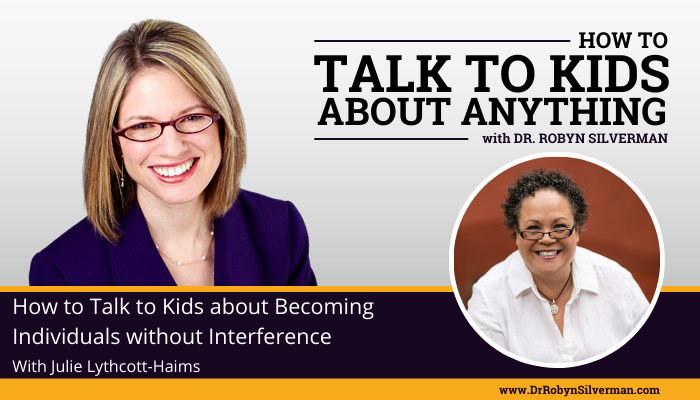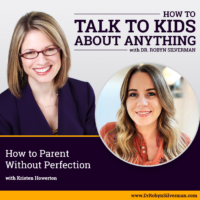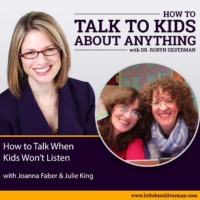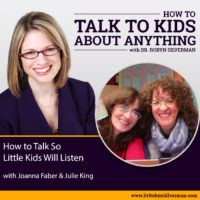Podcast: Play in new window | Download
Subscribe: Apple Podcasts | RSS | More
How to Talk to Kids About Becoming Individuals Without Interference with Julie Lythcott-Haims

When I asked my next guest to come back on the show and I wanted to know what she’d like to discuss this time because she has such interesting perspective and a way with words—and she said, she’d like to talk about how “kids don’t thrive when they’re raised like dogs on a leash who have to go a certain way to please their owner (parent).” You see my next guest did this amazing, extremely popular Ted Talk in 2016 entitled “How to Raise Successful Kids- without Over-Parenting” which has just about 7, 500, 000 views now. And in it she talks about how mapping out our children’s every move, check-listing their childhood so that they get into the right colleges and get the right jobs doesn’t actually make a successful, fulfilled person unless success is only moving up a preconceived and narrow ladder that may not actually feel like success for your child. How can we, as parents, drop the rope—or the leash—that is keeping our children from their passions, from their individuality, from their destiny—and how can we talk to our children about embracing who they are, learning who they want to be and willingly taking the steps to forge their own path? For that, we are turning to Julie Lythcott-Haims.
Special Guest: Julie Lythcott-Haims
When I asked my next guest to come back on the show and I wanted to know what she’d like to discuss this time because she has such interesting perspective and a way with words—and she said, she’d like to talk about how “kids don’t thrive when they’re raised like dogs on a leash who have to go a certain way to please their owner (parent).” You see my next guest did this amazing, extremely popular Ted Talk in 2016 entitled “How to Raise Successful Kids- without Over-Parenting” which has just about 7, 500, 000 views now. And in it she talks about how mapping out our children’s every move, check-listing their childhood so that they get into the right colleges and get the right jobs doesn’t actually make a successful, fulfilled person unless success is only moving up a preconceived and narrow ladder that may not actually feel like success for your child. How can we, as parents, drop the rope—or the leash—that is keeping our children from their passions, from their individuality, from their destiny—and how can we talk to our children about embracing who they are, learning who they want to be and willingly taking the steps to forge their own path? For that, we are turning to Julie Lythcott-Haims.
Bio
Julie Lythcott-Haims believes in humans and is deeply interested in what gets in our way. Her work encompasses writing, speaking, public service, and activism. She is a New York Times bestselling author of books on human development, a TED speaker, a former Stanford dean, and a lawyer, and she holds a BA from Stanford University, a JD from Harvard Law, and an MFA from California College of the Arts. She serves on numerous nonprofit boards whose work focuses on equity, education, youth, wellness, or the arts. Julie lives in Palo Alto, California with her partner of over thirty years, their itinerant young adults, and her mother. She is a member of the Palo Alto City Council. Her latest book is a follow up to How to Raise an Adult, which was the topic of our last podcast episode together, and it’s called Your Turn: How to Be an Adult.
Important Messages:
- How can I help you grow stronger and more confident around the notion that this is your life, your one wild and precious life, quoting the late poet Mary Oliver? It is yours, not theirs. It is therefore on you to craft and shape and you are going to screw up. And that’s fine. You’re going to figure yourself out over time. That is what it means to live and I am rooting for you to do it.
- I’m a parent, just like everyone listening, we parents know a lot. We have good instincts, we have hopes and dreams and for our kids, we’re trying to do right by them. I want you to know as I’m about to give this advice that I am a parent who needed this advice. Being a dean, writing a book on the subject. I thought I understood what other people were doing wrong. And then I very humbly came to appreciate, oh, I’m doing it. I’m cutting my 10 year old’s meat. That was when I, oh God, yes, I was that parent, right? That I couldn’t be able to let go of an 18 year old at the college level or whatever he was going to do after high school if I’m cutting the meat of a 10 year old.
- There are so many life skills that have to be taught and learned and perfected, and eight years from 10 to 18 is not enough time. You got to get in the passenger seat and let them drive. Okay? You’re still there for the just in case moment. So they don’t drive off a cliff, but like, it’s their life.
- “My child is on the soccer team” “Not we” are on the soccer team.
- You feel you have to check those data and square them against what your kid has said and you’re constantly checking. That’s a degree of surveillance and anxiety that you’re buying into that is incredibly unhealthy and shows you don’t trust your kid. You don’t believe that they’re getting a good education. You don’t believe that they know how to work hard, that they can improve over time.
- This is micromanaging parenting.
- Neurodiverse kids? Need to create systems so that the parent isn’t being used to check on the homework each day and get the kid to do his or her homework. May need a different school all together.
- So let me just highlight that. Are we the problem? In addition, can we convey to our kids that their individualism, their experimentation, their lack of perfectly fitting into some preconceived box society or family has sculpted for them is okay with us and in what’s supposed to happen as opposed to this check-listed childhood that many have created and live by.
- Don’t do a child’s homework for them. Teachers are left not knowing what kids actually know how to do. And worst of all, it tells your precious child, Hey kid, I don’t think you can succeed in the fourth or seventh or 12th grade, but don’t worry, I’ll do your work for you.
Why do people do this? We’re afraid if I don’t do their homework, they will not have the future I need them to have. - Why do you need that future so badly that you’re willing to commit this really unethical act and furtherance of getting your kid to some outcome? They won’t even actually reach the kid can’t have the successful future if the path has been paved by you doing their work. You constantly rescuing them. This is a short-term win if I turned in the homework for them, or I completed the essay for them, but the long-term losses, your kid can’t do it for themselves. And it’s really your fault, actually. So go get some therapy, listen to a podcast like this. Become the parent who has well examined your own fears, your own insecurities.
- Script: Homework issue. Don’t take over. Instead: “Let me know if you need any help with this. But I also trust that you can have the conversations you need to have with your teacher. I’m always here when you need me, and then smile and walk away.
- The walking away actually shows them, I am not so worried about this, that I need to step in and micromanage and fix this. I, it also says, I trust you’ve got this. I am not going to make a big deal out of this. Helps bring the pressure down. And also to the example you raise. How can we talk about their individualism or their lack of fitting in or the fact that they will make mistakes, again, emotionally regulated and knowing we are a separate being from them. We can then say to them, you know, ‘when you want to talk, if you want to talk about your identity, if you want to talk about what’s going on in your social life, I am here.”
- I have thoughts, but I don’t need to fix anything. I’ll give you ideas if you want them. But I’m also here to just listen. Just being present with our kids as they have their tough feelings about pressure, stress, social life, friends, feelings, whatever. Just being present signifies. There is nothing about your emotion that scares me. I’m not feeling a need to change it, to discard it, to dismiss it or fix it. I’ll just be present with you as you have these feelings. And if you want some advice, I will scan my thoughts, you know, my brain and my heart to see what I can offer. And we’ll go from there.
- The better pedagogy coming from the teacher would be, could we have a parent teacher, a teacher, parent kid meeting where we talk this through together? “I can see you have some concerns and you want me to get involved in making this happen. I actually want my kid to be the kid who can learn this. Could we come in and meet with you together? Where we talk about what your expectations are and the kid can ask questions and can clarify and so on.”
- And I can say, I’m here to support you buddy, but you’re the one that’s the second grader or the fifth grader, whatever it is, you know, where we can make clear that this is not neglect. This is me trying to empower my kid to be the one to take the reins in their own life.
- The minute they learn to walk, they’re learning more skills and, and skills are not learned in one effort. They’re learned over time through trial and error. They’re l they get stronger and better each time. They have the opportunity to, to try it. Let’s, let me reframe it. The teacher says your child doesn’t seem to know how to cross the street, so I need you to always cross the street with them. That’s not a forever solution. Take your kid to that street. Narrate how we learn to cross the street, how we look left and right and left. How we stand back from the curb and how we know it’s safe to cross and, and, and speak of it.
- Teach them, hold their hand, walk it together a number of times, then move to the step where you say, okay kid, I’m here with you, but it’s your turn to decide whether it’s safe to cross mm-hmm. And you’re still there to make sure they don’t, you know, for, you know, miss that speeding car. But at some point the kid has done it enough that you can no longer be there. That’s the teaching method we’re looking for. The teacher is saying, carry your kid across the street because they can’t. And you the parent have to know–but one day they have to as well. So I have to move from step one. I do it for them to step two. I step two, I do it with them teaching them narrating to step three. I’m still there for the, just in case, but now they’re doing it to step four. I don’t have to be there anymore.
- Stacy Ashland: Show them how, have them do it with you and they are your helper, you do it with them as their helper, they do it by themselves.
- Instead, teach them the skills. Too many of our youth have been taught, don’t talk to strangers, therefore don’t you dare go into a store without me. And then they’re deprived of this basic act of procuring groceries. And then they become young adults who feel stupid, silly, bad, embarrassed because they don’t have this basic skill and they’re wondering, why don’t I feel like an adult? And part of it is, well, you were never allowed to practice along the way. Mm-Hmm. getting places on their own walking places, biking places, public transportation. Many of us are so afraid that we prevent our kids from having the smaller experiences that would lead to them being able to get on that subway in the big city one day. And they don’t know how to read maps. They don’t know how to read signs. They don’t know how to, you know, handle the turns style or the place where you buy a ticket.
- Learn how to navigate the airport without guiding them. Get on a train.
Notable Quotables:
- “There are so many life skills that have to be taught and learned and perfected, and eight years from 10 to 18 is not enough time. You’ve got get in the passenger seat and let them drive. You’re still there for the ‘just in case’ moment– so they don’t drive off a cliff–but it’s their life.”
- “We’re afraid if I don’t do their homework, they will not have the future we need them to have. But the kid can’t have the successful future if the path has been paved by you doing their work. This is a short-term win but a long-term loss if your kid can’t do it for themselves. And it’s your fault, actually. So go get some therapy, listen to a podcast like this. Become the parent who has well examined your own fears, your own insecurities.”
- “You can develop the philosophical stance of, ‘my kid is not my pet on a leash.’ ‘My kid is not my potted bonsai tree on my living room dining room table.’ ‘My kid is not my project.’ ‘The evidence of my worth, their homework is not my trophy.’ Instead, have the philosophical respect for the fact that ‘my kid is a human being separate from me, given to me by God or the universe, or however you believe we got here. And my job is to love the heck out of them, feed them well, shelter them, teach them work ethic, teach them to be kind to others and get the hell out of their way.’”
- “Too many of our youth have been taught, don’t talk to strangers, therefore don’t you dare go into a store without me. And then they’re deprived of this basic act of procuring groceries. And then they become young adults who feel stupid, silly, bad, embarrassed because they don’t have this basic skill and they’re wondering, why don’t I feel like an adult? And part of it is, well, you were never allowed to practice along the way.”
This week on my podcast, @jlythcotthaims reminds us that our kids are not our pets on a leash or a potted bonsai tree. They are ours to love, feed, and then, get out of their way.
Click To Tweet
Resources:
- www.julielythcotthaims.com
- Book: Your Turn
- Book: How to Raise and Adult
- Ted Talk #1
- Ted Talk #2
The post How to Talk to Kids About Becoming Individuals Without Interference with Julie Lythcott-Haims appeared first on drrobynsilverman.com.








